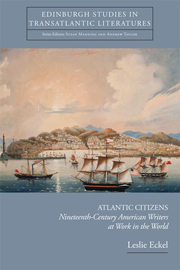Book contents
- Frontmatter
- Contents
- Acknowledgements
- Dedication
- Introduction: The Vocational Routes of American Literature
- 1 Longfellow and the Volume of the World
- 2 Fuller's Conversational Journalism: New York, London, Rome
- 3 ‘A type of his countrymen’: Douglass and Transatlantic Print Culture
- 4 Between Cosmos and Cosmopolis: Emerson's National Criticism
- 5 The Professional Pilgrim: Greenwood Sells the Transatlantic Experience
- 6 Standing Upon America: Whitman and the Profession of National Poetry
- Afterword: Vocation or Vacation? Transatlantic Professionalism Now
- Notes
- Bibliography
- Index
6 - Standing Upon America: Whitman and the Profession of National Poetry
Published online by Cambridge University Press: 05 September 2013
- Frontmatter
- Contents
- Acknowledgements
- Dedication
- Introduction: The Vocational Routes of American Literature
- 1 Longfellow and the Volume of the World
- 2 Fuller's Conversational Journalism: New York, London, Rome
- 3 ‘A type of his countrymen’: Douglass and Transatlantic Print Culture
- 4 Between Cosmos and Cosmopolis: Emerson's National Criticism
- 5 The Professional Pilgrim: Greenwood Sells the Transatlantic Experience
- 6 Standing Upon America: Whitman and the Profession of National Poetry
- Afterword: Vocation or Vacation? Transatlantic Professionalism Now
- Notes
- Bibliography
- Index
Summary
Yet we are right to know and to recall that this man was born among us: that he never left our lands. He talked with God, standing upon America as Moses upon Sinai. He talked with God, speaking our tongue. America therefore is holy land to us. Not because Whitman stood upon it, but because we have faith that there is meaning in the fact that Whitman stood upon it. Because we cannot be so weak as to doubt that in this juncture of his spirit and our land is revelation.
Waldo Frank, Our America (1919)Make the works.
Motto above Whitman's desk in CamdenIn 1883, Emma Lazarus wrote the poem that literally built the foundation of an American icon: the Statue of Liberty. Her sonnet ‘The New Colossus’, in which she allows the nation to speak in the voice of the ‘Mother of Exiles’, reflects a number of literary influences and political agendas that actually do more to disrupt a sense of shared national purpose than to confirm its now familiar platitudes. In her early years, Lazarus formed an unexpectedly strong bond with Emerson, who urged her to read the work of Thoreau and Whitman. She responded eagerly to their writing, telling Emerson that they seemed truly ‘in harmony with Nature’. Lazarus's reading of Whitman and her subsequent composition of the poem that cast the American project in heroic terms might be told as a purely national story, for Lazarus herself was committed to the promotion of an independent national tradition in literature.
- Type
- Chapter
- Information
- Atlantic CitizensNineteenth-Century American Writers at Work in the World, pp. 153 - 180Publisher: Edinburgh University PressPrint publication year: 2013



